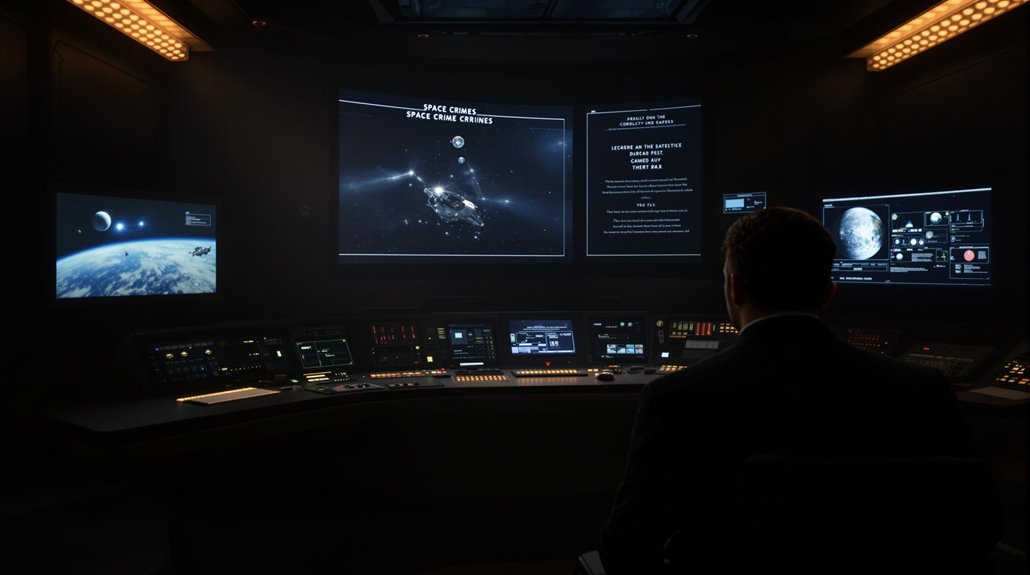Crime in Orbit: Who Prosecutes Space Crimes?
As humanity stretches its fingers deeper into the cosmic void, you'll find that crime doesn't stop at Earth's atmosphere. You've probably never considered who'd handle a theft on a space station or how assault charges would work in zero gravity. While nations maintain jurisdiction over their own astronauts and equipment, the legal framework for prosecuting space crimes remains as murky as a nebula. What happens when criminal activity transcends terrestrial boundaries? The answer isn't as straightforward as you'd think.
The Legal Framework for Criminal Justice in Space

While space exploration continues to advance rapidly, the legal framework for handling criminal activities beyond Earth's atmosphere remains surprisingly underdeveloped.
Though several space treaties exist, including the 1967 Outer Space Treaty and the Liability Convention, they don't specifically address criminal conduct in space.
You'll find significant jurisdictional issues when it comes to prosecuting space-based crimes. Current international agreements focus mainly on peaceful exploration, liability for damages, and astronaut rescue operations. The first space crime occurred in 2019 when NASA astronaut Anne McClain was accused of accessing her ex-wife's bank account from the International Space Station.
There's no dedicated criminal code for space offenses, and you can't rely on traditional law enforcement methods in the cosmic environment. Legal experts suggest that state licensing could serve as a preventative measure against criminal behavior in space.
While some countries like the U.S., Russia, and China have national space laws, these regulations weren't designed to handle criminal investigations or prosecutions beyond Earth's orbit.
Current Jurisdiction on the International Space Station
The International Space Station operates under a complex jurisdictional framework established by the 1998 ISS Intergovernmental Agreement.
This landmark document promotes international cooperation while letting you know exactly who's in charge of what in space.
The ISS's jurisdictional system works through these key principles:
- Each partner nation controls its own modules
- You're subject to your country's laws while aboard
- The ISS Commander has authority over all crew members
- Jurisdiction conflicts get resolved through established procedures
If you commit a crime on the ISS, you'll face prosecution under your nation's laws.
However, if your actions affect other partners' crew or equipment, those nations might also claim jurisdiction.
In such cases, countries must consult each other, and if your home nation doesn't act, the affected country can prosecute you.
This system is similar to maritime law which has long governed criminal conduct on international waters.
The need for clear jurisdictional frameworks becomes increasingly important as space tourism introduces new legal challenges regarding liability and criminal jurisdiction.
Space-Based Criminal Activities and Their Earth Impact
As space exploration and commerce expand rapidly, criminal activities beyond Earth's atmosphere pose increasingly serious threats to our daily lives.
Space resource theft and satellite sabotage can disrupt essential services you rely on, from GPS navigation to weather forecasting and global communications.
You mightn't realize it, but criminal activities in space directly impact Earth's economy and security.
When criminals target space infrastructure, they can compromise national defense systems, trigger financial losses, and create dangerous orbital debris.
The growing commercialization of space has opened new opportunities for cybercrime, with hackers targeting sensitive space-based data systems.
Environmental damage from spacecraft operations, including harmful chemical and radiological pollution, represents another form of space-related crime requiring international oversight.
Additionally, you'll find that these crimes often spark international tensions, as space assets frequently serve multiple nations and determining jurisdiction for prosecution can be complex.
Current laws dictate that crimes committed aboard the International Space Station fall under the perpetrator's nationality when determining legal jurisdiction.
Challenges of Investigating Crimes Beyond Earth
Investigating crimes in space presents unprecedented challenges that test conventional law enforcement methods. The microgravity environment disrupts evidence preservation, making it difficult to analyze blood patterns or collect trace materials.
You'll find that space debris and closed-loop systems further complicate forensic investigations. The lack of trained forensic astronauts severely impacts the ability to properly process crime scenes.
Key obstacles investigators face include:
- Limited access to forensic tools and lab facilities
- Complex jurisdictional issues when crimes cross multiple nations
- Communication delays that hamper timely investigations
- Challenges in maintaining proper chain of custody
Without specialized forensic training, astronauts may struggle to properly document and collect evidence.
Digital crimes pose additional hurdles, as securing electronic evidence in space requires unique protocols.
When you consider the practical limitations of conducting trials and enforcing penalties in space, it's clear that current legal frameworks need significant adaptation.
Law Enforcement Agencies in Space Operations

While multiple agencies monitor space activities, no single organization holds extensive law enforcement authority beyond Earth's atmosphere.
 Artemis Accords of 2020 provide additional guidelines for civil space exploration and potential law enforcement scenarios.
Artemis Accords of 2020 provide additional guidelines for civil space exploration and potential law enforcement scenarios.
You'll find that jurisdiction over space-related crimes currently falls to individual nations under the Outer Space Treaty framework.
For example, if you're aboard the International Space Station, you're subject to your home country's laws, as each nation maintains authority over its citizens and modules.
With Space Systems Command handling acquisitions and space security technology, monitoring potential criminal activities in orbit has become more sophisticated.
This system, while functional, highlights the need for a more thorough space law enforcement structure.
The Future of Criminal Justice in Outer Space
The future of criminal justice in space presents unique challenges that current Earth-based systems can't fully address. As you venture into this new frontier, jurisdictional ambiguity becomes a primary concern, requiring innovative solutions that blend technology with legal frameworks. The development of a robust legal framework is crucial as satellite industries expand rapidly. The Code of Conduct for the International Space Station exemplifies how ethical guidelines are essential for maintaining order.
To tackle these challenges, you'll see the emergence of specialized systems designed specifically for space-based justice:
- Virtual courtrooms enabling real-time trials across vast distances
- AI-powered evidence collection and analysis tools
- Remote investigation protocols adapted for zero-gravity environments
- Unified international space ethics guidelines
The evolution of space-based criminal justice will depend on cooperation between spacefaring nations and the development of standardized procedures.
You'll witness the transformation of traditional legal concepts into adaptive frameworks that can handle everything from minor infractions to serious crimes in the cosmic frontier.










